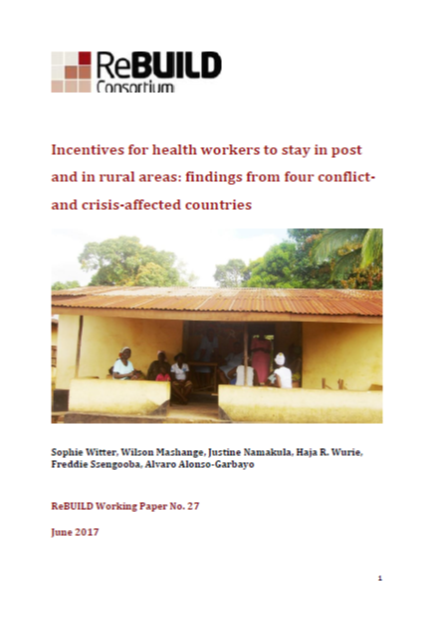Incentives for health workers to stay in post and in rural areas: findings from four conflict- and crisis-affected countries
 Witter, S., Mashange, W., Namakula, J., Wurie, H.R., Ssengooba, F. and Alonso-Garbayo, A. (2017)
Witter, S., Mashange, W., Namakula, J., Wurie, H.R., Ssengooba, F. and Alonso-Garbayo, A. (2017)
ReBUILD RPC Working Paper No. 26
This working paper presents a cross-cutting analysis of ReBUILD’s research into health worker incentives in four post-crisis settings (northern Uganda, Sierra Leone, Cambodia and Zimbabwe) to understand the context, system and personal factors which helped to motivate and retain them in public or private not-for-profit service.
You can download the working paper here.
Summary:
Attracting and retaining health staff in remote areas is a challenge for many countries, and crisis-affected settings face more severe challenges. This working paper presents a synthesis analysis of ReBUILD’s research on health worker incentives in four post-crisis settings (northern Uganda, Sierra Leone, Cambodia and Zimbabwe) to understand the context, system and personal factors which helped to motivate and retain them in public or private not-for-profit service.
The research suggests that in disrupted settings staff have similar aspirations as in more stable settings. However, policy and wider contexts are often more hostile, with often poor implementation of any policies which aim to support rural retention. Positive factors highlighted by staff point to the importance of local support mechanisms, selection of staff with strong service ethics and local ties, and a greater focus on lower cost but influential areas such as fostering improved communication with staff, along with supportive collegial and working conditions.
We welcome comments on ReBUILD’s working papers. For further information or to make any comments on the paper, please contact Sophie Witter.